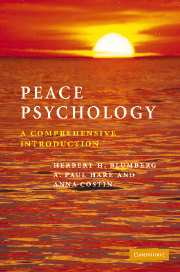Book contents
- Frontmatter
- Contents
- Preface
- Acknowledgements
- The scope, structure and content of this book
- Part I Introduction
- Part II Interdisciplinary practice
- Part III Primary psychological topics
- Part IV Core topics in peace and environmental studies
- 9 Conflict resolution
- 10 Emergency decisions, crisis management and the effects of conflicts
- 11 Nonviolence and peace movements
- 12 Peacemaking, wars and crises
- 13 The Middle East, Russia and other specific areas
- 14 Sustainable development
- Part V Terrorism
- References
- Index
9 - Conflict resolution
Published online by Cambridge University Press: 05 June 2012
- Frontmatter
- Contents
- Preface
- Acknowledgements
- The scope, structure and content of this book
- Part I Introduction
- Part II Interdisciplinary practice
- Part III Primary psychological topics
- Part IV Core topics in peace and environmental studies
- 9 Conflict resolution
- 10 Emergency decisions, crisis management and the effects of conflicts
- 11 Nonviolence and peace movements
- 12 Peacemaking, wars and crises
- 13 The Middle East, Russia and other specific areas
- 14 Sustainable development
- Part V Terrorism
- References
- Index
Summary
The chapter begins with references to books and articles that provide a general introduction to conflict resolution, an overview of research, or a focus of some aspect of theory, method or application. This is followed by a review of research on the influence of culture on conflict management since many conflicts involve individuals from different cultural backgrounds and there is a concern about the extent to which models developed in the West apply in other parts of the world.
Negotiation, as a method of conflict management in international, national and intergroup disputes, is treated extensively, including techniques that support international negotiation, training, research methods and some research on problem-solving and decision-making, since negotiation is one form of problem-solving.
The next topic is mediation, also with reference to international, national and intergroup disputes, including techniques supporting international mediation and community mediators, with some comments that would also apply to negotiation, on the possibility of using conflict constructively.
The next section focuses on aspects of conflict and various methods for resolving conflict, especially bargaining, that have been investigated using laboratory experiments, surveys, simulations, activities and games. The chapter ends with a brief review of research on conflict in small groups.
Introductions and overviews, general
Books
Several books provide introductions to methods of conflict resolution and surveys of research. The focus may be on conflicts within a community, or a country, or between countries, or all of these.
- Type
- Chapter
- Information
- Peace PsychologyA Comprehensive Introduction, pp. 97 - 132Publisher: Cambridge University PressPrint publication year: 2006



